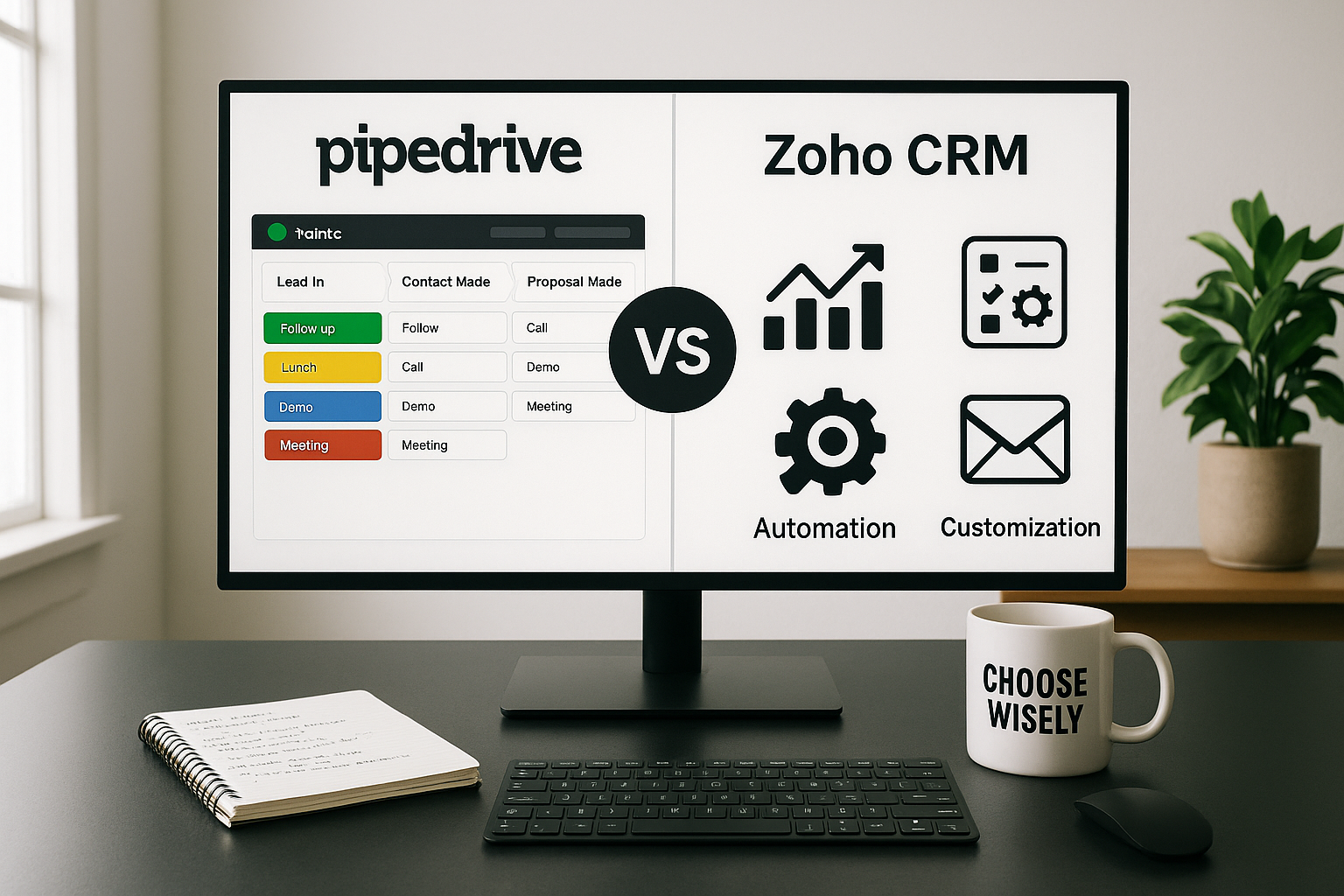Enterprise resource planning (ERP) and customer relationship management (CRM) are the two main software solutions that businesses use to automate fundamental business procedures. CRM helps companies manage how customers interact with their businesses, whereas ERP helps companies run successful operations by integrating their financial and operational systems into a single database. That’s the main ERP and CRM difference.
Leading CRM Software
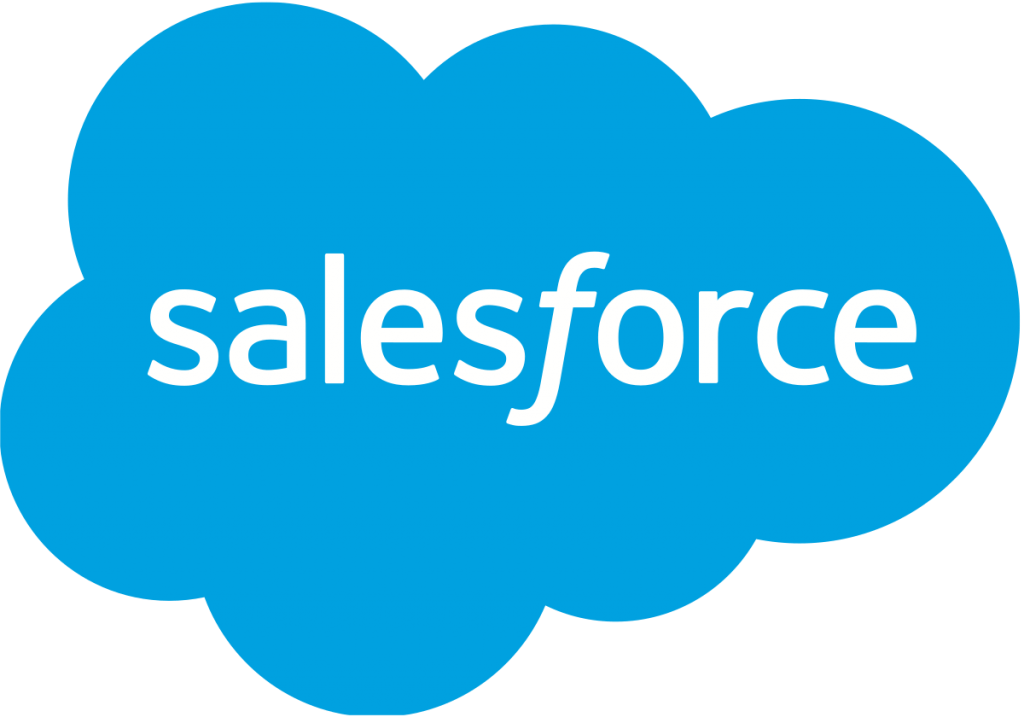
4.4
Both are important data storage platforms. Both cover a wide range of areas, and while they are occasionally designed on the same platform, the software is frequently purchased independently and merged as needed.
This article will help you understand the key difference between CRM and ERP systems.
What is ERP?
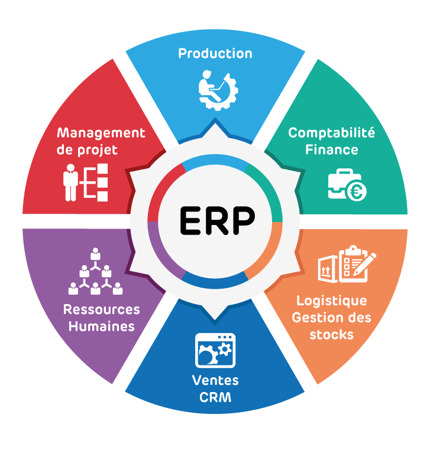
CRM is used to manage customers, while ERP is used to manage businesses. ERP stands for Enterprise Resource Planning, and it's a system for making corporate processes more efficient. It’s one ERP CRM difference. ERP, like CRM, enables the rapid sharing of standardized data across all departments. Employees enter data into the ERP system in real-time, providing an enterprise-wide snapshot. Any issues in one location will instantly trigger notifications in other areas. This enables departments to start preparing for difficulties before they become a problem. In summary, ERP allows businesses to focus on data rather than operations, allowing them to streamline corporate processes across the board.
The top 5 ERP systems include:
- NetSuite - enterprise resource planning (ERP) system is equipped with a wide range of modules designed to automate business processes, enhance operational insights, and empower enterprises with greater control over their resources.
- Microsoft Dynamics 365 - As an ERP product of Microsoft, it provides users with a user-friendly interface and application environment. Additionally, it seamlessly integrates with other popular Microsoft products like Power BI and Project Server, making it a convenient choice for businesses.
- SAP - stands out as a leading player in the ERP market, offering cutting-edge AI technology and powerful real-time data analytics capabilities. With SAP, businesses can harness the power of advanced technology to gain valuable insights and make informed decisions for enhanced efficiency and productivity.
- Oracle ERP Cloud - stands as a prominent player in the ERP market, providing businesses with advanced artificial intelligence capabilities. With Oracle ERP Cloud, organizations can leverage intelligent algorithms to forecast patterns in large data sets, identify biases and anomalies, take proactive measures, and develop strategic plans for the future.
- Infor Cloud Suite provides a diverse array of ERP solutions. The ERP software offers industry-specific functionalities that are built on the powerful AWS and Infor OS infrastructure, eliminating the need for users to make extensive customizations.
What is CRM?
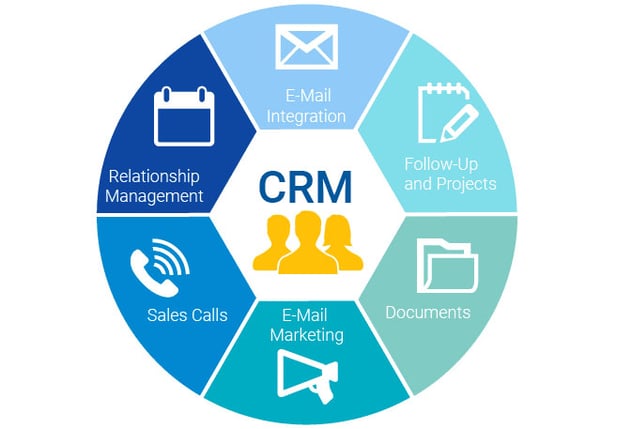
CRM, in its most basic form, is a set of systems and procedures for managing a company's contacts with existing and potential customers. We normally refer to CRM software when we talk about CRM systems. Sales, marketing, and customer support are all organized, automated, and synchronized with CRM software.
CRM has grown to incorporate all aspects of the customer experience, ensuring that customers are satisfied, loyal, and useful to your company. It's the process of identifying potential leads/prospects, nurturing them, and helping them through the sales process until the deal is closed. Once they've become a customer, it's up to you to keep the relationship going and drive repeat business - either through more regular orders or bigger dollar amounts.
Here are the best CRM solutions:
- Salesforce - one of the most widely used CRM systems globally. It offers a comprehensive suite of tools for sales, marketing, and customer service. It is known for its flexibility and scalability, making it suitable for businesses of all sizes. Salesforce provides a wide range of integrations and a robust ecosystem of third-party apps.
- HubSpot CRM - a user-friendly and affordable CRM solution. It focuses on inbound marketing and sales, providing tools for lead generation, email marketing, and customer relationship management. It's an excellent choice for small and medium-sized businesses looking to grow and manage their customer relationships.
- Zoho CRM - a cloud-based CRM software that caters to businesses of all sizes. It offers a wide range of features, including contact management, sales automation, and analytics. Zoho CRM is known for its affordability and ease of use, making it a popular choice for small businesses.
- monday.com - a popular work operating system and project management platform that helps teams and organizations streamline their work processes and collaborate more effectively. It is known for its visual and intuitive interface, which allows users to create, manage, and track various work-related tasks and projects.
- Pipedrive - a CRM designed specifically for sales teams. It focuses on managing sales pipelines, automating tasks, and providing sales analytics. Pipedrive is user-friendly and particularly beneficial for businesses looking to streamline their sales processes and improve deal tracking.
[Related Article: Benefits of CRM: Jump to New Achievements [Infographic]]
What is the difference between ERP and CRM software?
Every digital company or sector needs a system to quickly share current information and manage the overall process with staff and consumers. The goal was to create a software solution that integrated customer service with the company's offers. Let's see what we have to discuss about the difference between ERP and CRM.
- ERP versus CRM: Enterprise Resource Planning (ERP) :
ERP stands for Enterprise Resource Planning, and it's a software program that helps businesses with anything from logistics to management. It assists with the management of key business processes such as human resources, order management, accounting, and more. This software serves as a centralized system for streamlining all of an organization's procedures and information flow.
The following are some significant ERP features:
- This software is used to connect all of the services required to run the business.
- These applications are web-based and accessible via any interface.
- ERP software is in charge of tracking an organization's progress.
- These programs are used to manage an organization's resources.
- ERP versus CRM: Customer Relationship Management (CRM) :
CRM stands for Customer Relationship Management, and it's a piece of software that helps a company communicate with current and potential consumers. Customer service is managed by this CRM software, which also automates and synchronizes sales. The goal of creating such an application is to feed and entertain potential leads, allowing the company to enhance sales and overall performance.
CRM has the following key features:
- This software is used to bring all client services together in one location.
- This is used to administer and track the organization's functions.
- It helps in the improvement of sales performance.
- Customers are the primary priority.
[Related Article: How to Choose a CRM System: Checklist with 6 Tips]
How can ERP and CRM be integrated?
ERP and CRM systems must be able to share data, and this is better accomplished through technical integration rather than maintaining two sets of data.
When conducting an upsell or cross-sell campaign, a sales professional, for example, would seek to examine a customer's order history, credit status, or pending payments. When running payroll or bulk purchase discounts, the finance department may require access to the CRM system to calculate sales commissions. Business leaders that require a centralized approach to review pricing structures and monitor KPIs like client acquisition costs and customer lifetime value will benefit from a CRM system built on top of an ERP platform.
Configuring price and quote is a regular operation that requires tight integration of CRM in ERP. Many firms rely on CPQ technologies, which require information from CRM and ERP systems. CRM enterprise system and ERP companies often offer prebuilt integrations for one another, either directly or through a third-party partner. When the CRM vs ERP system is upgraded, however, these integrations can be costly and difficult to manage.
How do ERP and CRM help a company?
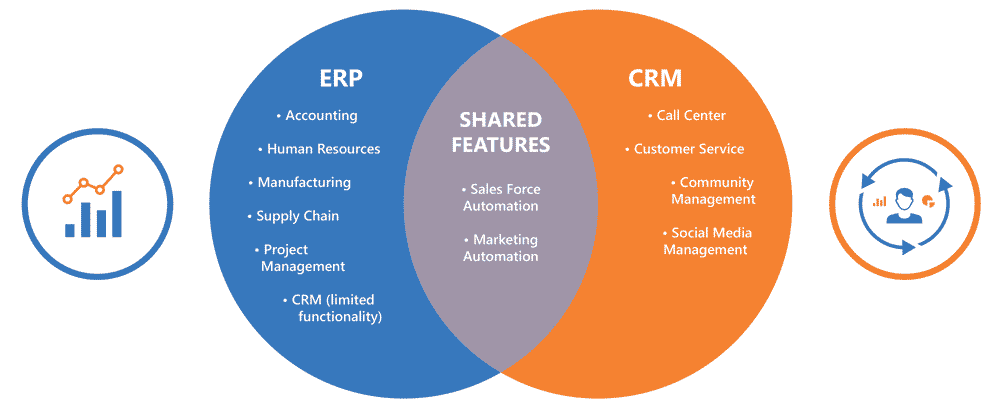
Companies looking to expand frequently worry about which system to use first. It can be difficult to choose between ERP vs CRM because they each have distinct advantages. Companies must increase sales and profit to scale, which requires the use of a CRM system.
An ERP system, on the other hand, uses precise and accurate inter-departmental data to drive the business. Organizations must have profits before they can cut expenses. Furthermore, a corporation can be exceedingly well organized but still not generate enough revenue to stay in business. Only regular sales revenue allows for business procedures.
So, what is the solution? You'll require both CRM ERP systems. A CRM system boosts sales, while an ERP system streamlines processes and reduces expenses. ERP or CRM that work together can improve business success.
How do CRM systems compare to ERP systems?
ERP CRM software is a business application that uses a relational database to store and analyze data. Both are available as on-premises software or as software as a service (SaaS), in which the vendor maintains the software in its own data center and users access it via the cloud.
While NetSuite and Salesforce.com, the two SaaS ERP and CRM pioneers, both started around the same time, CRM systems were faster to move to the cloud because they were easier to construct and businesses were originally hesitant to put financial data in the cloud.
While both ERP CRM systems will be used by the entire organization, the essential distinction between the two is that ERP is primarily for financial data and the finance department, while CRM is for customer data and is used by the sales and customer care departments. The former is known as the back office, while the latter is known as the front office.
Another difference between CRM and ERP software is that CRM software systems do not have ERP components, while some ERP systems do not include CRM components. Salesforce, for example, is not an ERP system because it does not deal with transactional data. It has access to order history and invoicing, but this information is obtained through an ERP system interface.
[Related Article: How CRM for EPC Creates Opportunities for Rapid Growth]
To Wrap Up
Robust CRM Choice
4.4
Let’s conclude what we wanted to say about the CRM and ERP differences. CRM helps companies in maintaining long-term client relationships. Furthermore, knowing about the preferences of clients and developing trust are both beneficial.
CRM plays a crucial role in understanding customer needs and preferences, allowing businesses to tailor their products and services accordingly. By analyzing customer data and interactions, CRM systems enable companies to personalize their marketing efforts, improve customer satisfaction, and ultimately build long-lasting relationships. Through features like contact management, lead tracking, and customer support automation, CRM software streamlines the entire customer journey and ensures that businesses can effectively manage their interactions with both existing and potential customers.
On the other hand, ERP brings together multiple organizational functional units so that they can easily share information and communicate with one another in real-time through a single computerized system. ERP systems integrate various business processes, such as finance, human resources, inventory management, and supply chain, into a unified platform. By providing a centralized database and standardized workflows, ERP software enhances operational efficiency, reduces duplication of efforts, and enables better decision-making across departments. With real-time data insights and seamless collaboration, businesses can streamline their operations, optimize resource allocation, and drive overall productivity and profitability.
Apart from the distinctions between ERP and CRM mentioned above, the two software have one thing in common: they both strive to boost the company's profitability. CRM focuses on enhancing customer relationships and driving sales, while ERP focuses on optimizing internal processes and resource management. By leveraging the power of both CRM and ERP systems, businesses can achieve a comprehensive and holistic approach to managing their operations, maximizing customer satisfaction, and ultimately driving sustainable growth and profitability.
.png?width=140&height=140&name=Noah%20(1000%20x%201000%20px).png)
(2).jpg)

